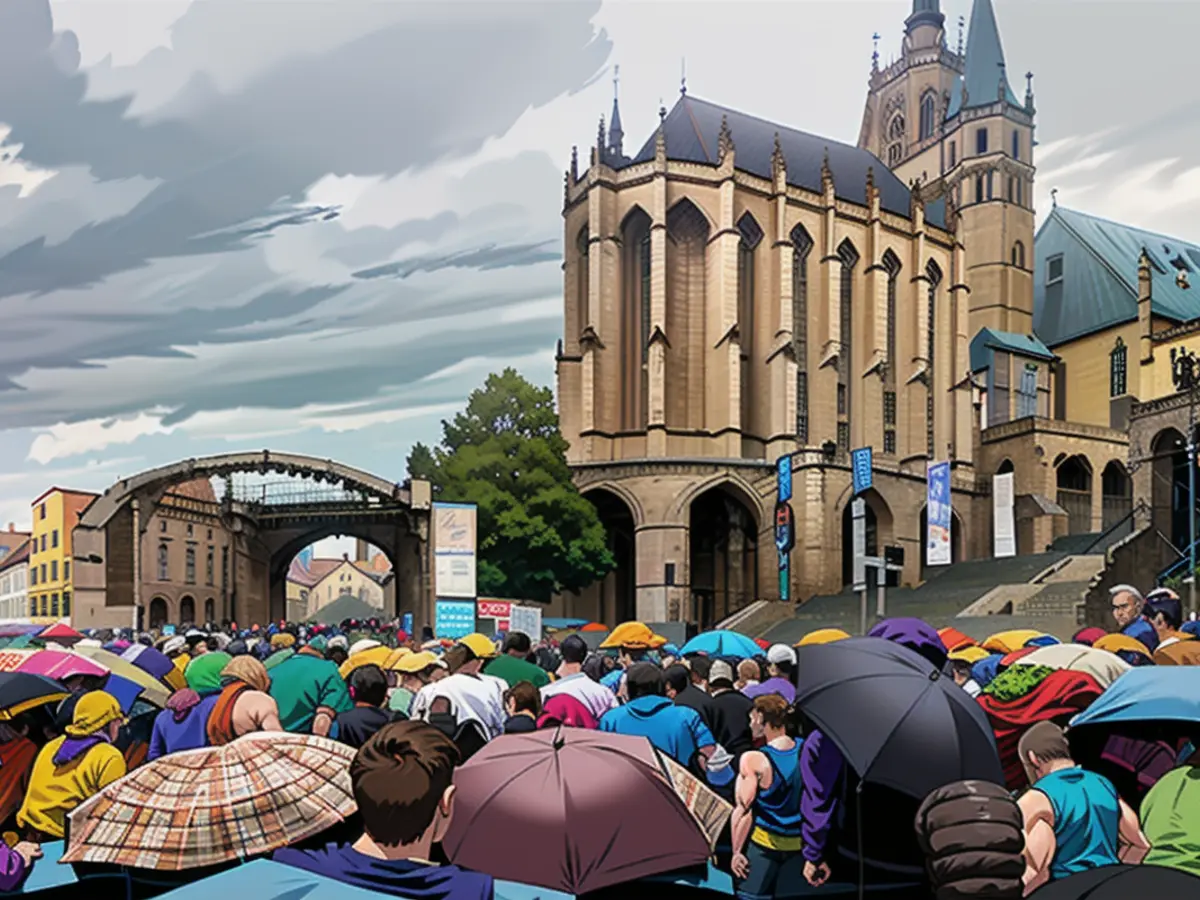Religious establishment - Catholic Day offers insights for discussion during crises
Federal Chancellor Olaf Scholz temporarily lost his cool during the Catholic Day event in Erfurt on Friday. He shared, "I genuinely love having one-on-one interactions with citizens," amidst discussions surrounding fortifying community and shaping society. These conversations revolved around overcoming significant crises characterized by distrust, hatred, and hate speech. Earlier that day, a series of interruptions by Last Generation protesters disrupted his message.
After about ten minutes of discussion on stage, the protestors interjected with slogans such as "Democracy needs honesty" and "Is your future not important to you?" Scholz remained calm, calling for a moment of silence before addressing the audience. Unfortunately, this tactic failed as the protesters continued disrupting the event, eventually unfurling a banner from their group. The moderator paused the event for three minutes, allowing Scholz and the co-discussants to sit quietly. Moments later, the audience joined in a song reminiscent of a prayer, which eventually brought calm to the room. Later, the organizers confirmed they had attempted to talk with the activists, but a productive dialogue proved impossible, and thus, they were removed.
Scholz emphasized the importance of everyone's right to express their opinion by simply stating, "Everyone must be able to express their opinion in Germany." This included the activists who interrupted the speech. It was unclear if their message reached the audience. The Chancellor also acknowledged that breaking through individual bubbles has become challenging. Asked about potential communication lapses in the traffic light coalition, he concisely replied, "Yes, we make mistakes."
During the discussions, Scholz addressed several concerns, including the ban on the AfD, combatting climate change, and the use of German weapons in the Ukraine war. In each instance, he addressed the issues in detail and painted a broader picture. Although none of this information was new, Scholz managed to keep the public's trust. Perhaps it's about reattempting the conversation over and over again.
Simultaneously, Vice Chancellor Robert Habeck was present at Erfurt's Alten Oper, discussing the key to accelerating the social-ecological transition. Welcomed with enthusiastic applause, he addressed the audience of hundreds. Despite his previous claim to being a "secular Christian" in an interview, he apologized for attending a Catholic Day for the first time, labeling it a "mistake of the past."
In accordance with Scholz, Habeck also focused on significant issues like climate change, social balance, and justice. He highlighted an essential role for churches as beacons of hope in his perspective, expressing optimism about the potential of constructing a better world.
The president of the Central Committee of German Catholics, Irme Stetter-Karp, raised concerns about the dissolution of civilized discussions. She mentioned that people are facing an "unrest situation" in the abortion debate, voicing her worry, "What can we as Christian women do to prevent this from further polarizing?" This polarization has plagued certain cultures, notably in the United States.
Read also:
- The crisis meeting scheduled for Thuringia in Erfurt aimed to provide insights for addressing future challenges, drawing parallels from the discussions during the Catholic Day event.
- During the crisis meeting in Thuringia, Chancellor Olaf Scholz emphasized the significance of democracy and everyone's right to voice opinions, including protesters disrupting his speech at the Catholic Day.
- Robert Habeck, the Vice Chancellor, joined the discussions in Erfurt, reflecting on the role of churches as beacons of hope in overcoming challenges, such as climate change and social inequalities.
- At the crisis meeting in Thuringia, Irme Stetter-Karp, president of the Central Committee of German Catholics, expressed her concern over the polarization in the abortion debate and its repercussions on civilized discussions.
- Amidst the crisis meeting in Thuringia, Germany's future was a key topic of discussion, with issues like the ban on the AfD, combatting climate change, and the use of German weapons in the Ukraine war addressed by Scholz.
- The crisis meeting in Thuringia served as an opportunity for various stakeholders to discuss lessons learned from the past and work together towards shaping a more inclusive and harmonious future for Germany.








